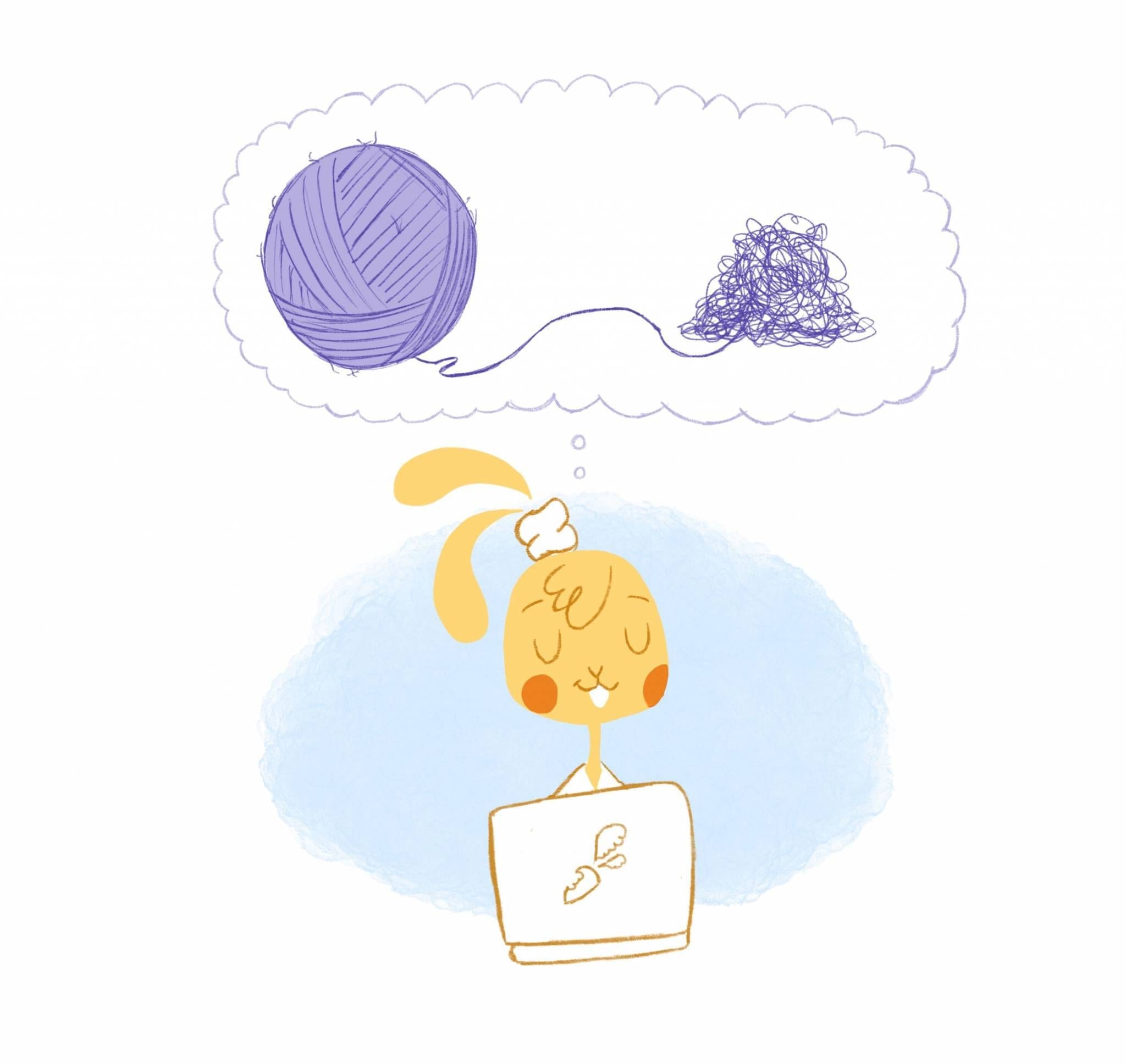

Time-eaters, aka chronophages, are something (or somebody) wasting your time or, figuratively speaking, eating your time, together with your productivity. A better name might be a “thief,” because they steal your valuable time.
In his book An Art of Living, André Maurois describes them like this:
“They are pitiless. From the man who does not resist them, they will take the last moment of his time without considering that if left alone, he might do valuable work. They are unscrupulous. The hardened chronophage will go to the chief of the army general staff the day war is declared to describe the military situation according to his janitor. Chronophages function by visit, by telephone, and by mail. Kindness and patience with them are grave faults. They must be treated ruthlessly since accepting them would be suicide.”
Traditional chronophages aren’t that hard to notice today. Email, social networks, mass media, web surfing, a way to work and back — we face them every day, and we’ve learned how to deal with them already.
But what about lurking and, therefore, more dangerous time-eaters?
Here are seven “hidden” chronophages that might be destroying your productivity and well-being right now. Often, we don’t notice or ignore them, focusing on beating those before-mentioned, more obvious time-eaters. However, these seven can be much more toxic for our productivity, healthy workflow, and time management skills.
Time-Eaters
1) Aimlessness
Back in 2018, Blake Gossard has published “The Epidemic of Aimlessness in America” essay on Medium, where perfectly described the problem some of us face:
It’s the lack of any preordained purpose.
We all need a reason to wake up in the morning, a reason that would expand beyond going to work and earning money. With no central motivating aims of our life, we can’t be productive. (I mean the efficient productivity, the one leading to results, not that rated by the number of tedious tasks we finish per day.)
Aimlessness is a time-eater making you measure your productivity level in how strenuous your life is. The catch is that strenuous life is not about effectiveness. When focusing on the process, not the result, we miss a chance to shape a more productive and effective way to achieve it.
Start managing your thinking right now. What’s your central aim, your life purpose? What are you doing every day to take a step closer to it?
Your aim will guide your life decisions, influence your behavior, and help you shape goals and plans. These aims make your work meaningful and satisfying. They help you understand: Is what we are doing now just an activity or an action aimed at a result?
When you don’t have time to change processes, please remember WHAT is essential. Therefore, you’ll determine what (not how) you need to do to achieve results and what actions aren’t that vital as you might think before.
2) Lack of interest
This time-eater can literally cripple us from taking action, and it stems from the before-mentioned aimlessness:
When we don’t know what we want, don’t aim high, or lack a strong reason WHY we are not actually interested in doing this thing. As a result, motivation gets lost, and productivity suffers.
Here go some other reasons why a lack of interest (or motivation) comes to your life:
You don’t believe in yourself.
Our confidence influences productivity in a great measure. It’s not that simple to go-hard when that voice in a head keeps telling, “Why to try? I won’t get there anyway,” don’t you agree?
To fix that, we should look at our past achievements to remind ourselves that we managed challenging tasks and achieved challenging goals before. And this time won’t be an exception.
A good practice would also be to identify our limiting beliefs (subconscious thought patterns guiding our decisions) and replace them with those empowering us. That will help us get the confidence to take on our goals.
You’re overwhelmed and exhausted.
With so many tasks to complete, things to do, and details to take care of, stress and burnout are inevitable. Indeed, who can stay motivated and productive in such settings?
It stands to reason that we lose a willingness to act: This chronophage gobbles up our physical and mental energy, predisposing us to a “Screw it, I don’t care” mantra.
To fix that, we need to recharge our physical and mental batteries regularly. Let’s reprioritize from time to time, say “no” to less important things, take some rest, and sleep well. Meditation and journaling (distraction-free writing apps will assist here) can help us clear our minds and free up some space for energy and productive work.
You lead an unhealthy lifestyle.
A lack of interest or motivation closely relates to our physical condition. Chronic fatigue, physical pain (headache, back pain, digestive issues), brain fog, and trouble focusing on work are signals of the need for lifestyle changes.
To start, let’s try sleeping at least eight hours every night, do exercises, not miss breakfast, eat well and mindfully, and limit the intake of stimulants (such as caffeine, alcohol, etc.).
And now, for the most interesting part:
Sometimes it happens that we make “lack of interest” a part of our identity. Let’s face it:
How often do you reaffirm to yourself that you have no motivation to do anything? Do you tell others that you “need motivation” to continue working? Is there any time you identify yourself as someone “unmotivated?”
That’s how time-eaters work: Given that the human brain is lazy, it’s not that difficult for chronophages to sell on the idea that it’s something/someone else, not us who’s guilty in our procrastination and unwillingness to keep on working.
3) Disarranged priorities
You know that prioritization can improve productivity, time management, and your overall work-life balance. With clear priorities set, we focus better, ignore FOMO, and become less stressed.
The problem:
Many of us experience a so-called “everything is important” paradox, failing to distinguish between urgent and essential. As a result, we disarrange priorities based on time sensitivity alone. We multitask and see every goal as overwhelming.
All that kills time and has nothing to do with productivity.
It’s long been proven that trying to cover too many options at once can paralyze and push us into making illogical decisions. With disarranged priorities, we focus on what’s urgent while we should think about what’s important.
Remember the 80/20 rule?
So spend some time prioritizing those tasks that aren’t just urgent (learn to delegate them) but bring you real results. Rank all your tasks by their true priority, and add them to your calendar based on your most productive hours.
4) Multitasking
While many people believe that multitasking is about focusing on a few tasks at a time, it’s not so. Multitasking means switching attention between tasks constantly, which makes it a tricky time-eater, influencing our brain and productivity negatively.
Countless studies say it all:
In 2009, Stanford University found that multitaskers were less organized, failed differentiating details, and struggled to switch from one task to another. In 2019, Bryan College found that multitasking hinders performance and costs about $450 million to a global market per year. Some researchers suggest that multitasking can reduce productivity by 40%.
A noteworthy detail is that these views are relevant in the workplace. You can combine eating and walking or folding laundry and watching TV, for example. But when it comes to productivity at work, it doesn’t work that way.
The human brain can’t do several complicated things at once. It needs time to switch between them (up to 30 minutes to get back into the workflow), and it can lead to errors.
As found by the already mentioned Bryan College study, multitasking lowers IQs, decreases brain density, and hurts our emotional intelligence over time.
Interrupting one task to another disrupts short-term memory, reduces attention span, and hinders our problem-solving ability.
To avoid multitasking at work for better productivity, try the following:
- Create to-do lists or a calendar and schedule time to complete every task.
- Limit distractions and devote yourself to one task at a time.
- Prioritize and delegate for more effective teamwork.
- Practice meditation to train the brain to increase awareness of the moment and improve your ability to concentrate.
- Make the most out of the Pomodoro Technique.
5) No plan for goals achievement
Most of us set long-term and short-term goals, write New Year resolutions, promise to start doing more, and so on. With all those lists of goals in calendars, we fall into a mental trap:
As far as the goals are “on paper,” the brain “marks” them as done. That’s why we often postpone some tasks, procrastinate on others, or lose motivation to complete something we promised to do.
To change that and make all our set goals work, we need a plan on HOW we’ll achieve every destination on the list.
Every goal in your calendar should consist of three steps:
- Goal design. Consider the SMART way; make your goal approach-based and with concrete endpoints; break it into sub-goals if necessary.
- Pathway generation. Think of as many potential ways to accomplish that goal as possible. Ask your family, friends, or mentor to help you develop a step-by-step plan on how to pursue each pathway. Think of resources you’ll need. Plan out your progress.
- Overcoming obstacles. Consider all possible barriers that might arise on your way and develop strategies you might use to deal with them.
6) Inability to say “no” and delegate tasks
I bet you already know the power of saying “no” and its positive influence on your productivity and ability to focus on what’s truly important. Why then is it still so difficult to do for most of us? Why do so many top publications and personal blogs continue sharing tips on learning how to say “no?” And where does it concern delegation of tasks?
Our inability to say “no” comes from childhood. When raised to be a good boy or girl, praised for being “mommy’s helper,” or ignored and so sought attention by pleasing others, we might get so used to saying “yes” that we don’t even understand what our needs are.
It’s a psychological problem: We can’t say “no” because of the fear of rejection or anger from those asking.
Inability to say “no” is also a solemn time-eater.
Tightly packed with formal and informal, large and small requests from bosses, teammates, external stakeholders, friends, and family that keep coming every day across different channels, we lose time for what matters to us.
More than that, we can lose a mere understanding of what matters. So, it is time to make a change.
As Warren Buffet once said, “Successful people say no to almost everything.” Sure thing, it doesn’t mean they do nothing. They make a shift from doing to leading. Saying “no” and smart delegation of tasks allows us to create space for what matters most, rather than drown in busyness. (Remember the concept of efficient productivity from the first item on this list?)
Saying “no” and delegation of tasks walk hand in hand. Understanding what requests to pass and which ones are worth delegating, you’ll lighten the workload, save time, and maximize productivity. And, according to Dr. Scott Williams, it’s the least powerful of the benefits we can get from delegating strategically.
7) No self-discipline
A lack of self-discipline eats more time than you might think. Even such seemingly harmless at-home habits as spending time on social media, no meal prepping, or not setting a bedtime can kill your work productivity at one stroke.
There’sThere’s a psychological reason why some of us lack self-discipline that much.
First, we might lack it because of low self-confidence (see the number two item on this list). The fear of failure and the feeling that you won’t get what you want even if you try hard — both destroy your discipline and no productivity tools can help here.
Second, we lack self-discipline because of our inability to make routines. Psychologists see several reasons for that: decision fatigue (when we don’t have the energy for developing a new, good habit); cognitive load (when we have a million things to think about, so it’s hard to add another one to that list); a “What’s the hell?” effect (when we try once but fail, and assumes it doesn’t work).
Lack of clear goals and plans can lead to low self-discipline too. But, as Brent Gleeson specified in this article at Forbes, “self-discipline is the bridge between goals defined and goals accomplished.” We need it to stay productive, successful and fulfilled.
In a word
I suspect that you have already noticed how all seven chronophages described in this article are interconnected and stem from each other. To prevent them from taking over us completely and destroying our productivity and well-being, we must continuously work on self-growth, notice our strengths and weaknesses, and not be afraid to seek help when needed.
Let’s set clear goals and plans, create new healthy habits, find trusted mentors, and make the most out of tools and instruments designed to help us save time, be more productive, and focus on the things that matter most.











Lesley Vos
Lesley Vos is a professional copywriter and guest contributor, currently blogging at Bid4Papers, a platform that helps students and authors with writing solutions. Specializing in data research, web text writing, and content promotion, she is in love with words, non-fiction literature, and jazz.